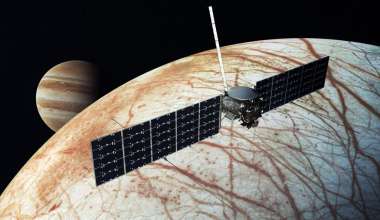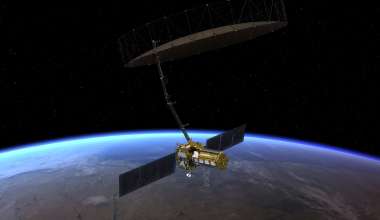To achieve significant improvement in nighttime imaging, CUMULOS uses point-and-stare imaging to keep pixels on target for up to one-half of a second to achieve excellent light sensitivity and focuses on selected scenes with a telephoto lens to deliver over five times the spatial resolution of current scanning polar-orbiting satellites.
“CUMULOS has proven that CubeSats can provide good-quality, higher-resolution nighttime images of city lights and other bright targets at a fraction of the cost of larger satellites by using inexpensive commercial cameras and their increasingly advanced focal plane arrays,” said Dee Pack, principal investigator for the CUMULOS mission and director of Aerospace’s Remote Sensing Department. “By trading wide area coverage for higher resolution, a CubeSat platform can be a real game changer for urban geographers and for nighttime remote sensing research.”
CUMULOS’ on-orbit calibration techniques allow comprehensive analysis of light patterns, which can be used to measure urban growth and energy usage, and detect wildfires and the spread of power grids in developing countries. Other applications are currently being explored.
Progress on the CUMULOS data visible camera pipeline is near completion. Aerospace scientists and engineers successfully gathered calibration data from bright stars for nighttime imagery of weather, boat light data, and the world’s major cities.

“It’s amazing to see that the infrastructure of bridges, roads, airports, rail networks, and refinery flares stand out in the nighttime lighting patterns,” said Pack. “We’re also able to view subtler lights from ships moored in the Tokyo Harbor and off the coast of Los Angeles, as well as dimmer lights in more remote areas.”
CUMULOS was designed as a compact payload for testing low-cost commercial cameras for weather and Earth environmental monitoring. It can measure surface temperature, detect fires and other environmental hotspots, take cloud cover pictures, and provide nighttime lights imaging by using three compact cameras: a visible wavelength camera, a short-wavelength infrared camera, and a long-wavelength infrared system microbolometer camera.
Flown as part of Aerospace’s AeroCube program, CUMULOS has the first infrared sensors that allow infrared weather imagery to be studied by a small satellite. Currently, it flies as a secondary payload on NASA’s Integrated Solar Array and Reflectarray Antenna (ISARA) CubeSat mission.
About Aerospace CubeSats
Aerospace was an early pioneer in the development of nanosatellites (1 to 10 kilograms; 4 to 12 inches) and picosatellites (0.1 to 1 kilograms; under 4 inches). Company researchers continue to conduct pathfinding research in the field by developing new technologies for smallsats that have not been previously demonstrated. Since 1999, Aerospace has flown 33 nano- and picosatellites, plus 6 reentry breakup recorders. Today, Aerospace is one of the leading private operators of satellite constellations worldwide with 19 AeroCubes currently operating on orbit on a variety of missions.
Cumulos Video
About The Aerospace Corporation
The Aerospace Corporation is a leading architect for the nation’s space programs, advancing capabilities that outpace threats to the country’s national security while nurturing innovative technologies to further a new era of space commercialization and exploration. Aerospace’s national workforce of more than 4,800 employees provides objective technical expertise and thought leadership to solve the hardest problems in space and assure mission success for space systems and space vehicles. For more information, visit www.aerospace.org. Follow us on LinkedIn and on X: @AerospaceCorp.




